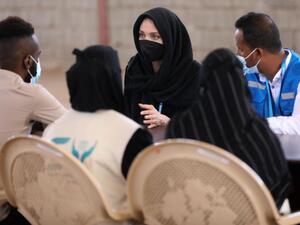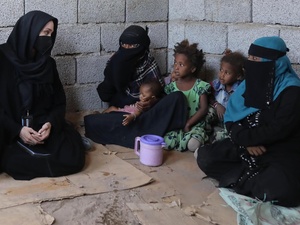With border closures into second week, Yemen suffering worsens
With border closures into second week, Yemen suffering worsens

A UNHCR staffer assists displaced Yemenis outside the IDP Community Centre in Sana'a.
UNHCR, the UN Refugee Agency, is alarmed at the worsening humanitarian situation in Yemen following the temporary closure of land, sea and air borders on 6 November. Over the past week the closures have prevented humanitarian and commercial supplies, and restricted the movement of aid workers. They are also placing new economic strain on a civilian population already suffering through many months of conflict.
With commercial traffic flows hampered, prices for essential commodities including food, trucked water, household gas and fuel are all skyrocketing. In Sana’a for instance fuel prices have reportedly increased by 60 per cent and trucked water by 133 per cent. As a result, our staff and those of our partners are seeing an increase in the number of civilians seeking humanitarian help. Vulnerable populations including internally displaced people, refugees and asylum seekers are especially hard-hit.
For example, at a UNHCR supported centre in Sana’a for the internally displaced, run by our partner ADRA, some 600 to 800 people are now approaching the centre every day. Before the border closures we would typically see 400 to 600 people. People say they are no longer able to meet basic needs or afford medical care. Some are facing the threat of eviction.
In Aden, where there were shortages of fuel and gas already before the border closures, displaced people are reporting that prices for food have almost doubled. Some people now have no other choice than to eat less.
For at least 329 refugees who were hoping to escape Yemen and return home to Somalia, supported by UNHCR and IOM through an Assisted Spontaneous Return program, three boat departures from the Port of Aden to Berbera in Somalia have been postponed.
Yemen’s conflict, which began in March 2015, has produced the world’s largest humanitarian crisis with 21 million people affected. Two million internally displaced people, a million returnees and 280,000 refugees and asylum seekers are all struggling to survive through increasingly prolonged displacement. As conditions worsen more people are resorting out of desperation to strategies such as child labour, recruitment and early marriage.
We have received reports that since the border closures, a number of displaced people – unable to afford the increased costs of living – have been leaving urban centres in Sana’a (in the country’s West) and returning to other governorates, including those in frontline areas. In the northern city of Sa’ada, for example, local humanitarian authorities report that up to 500 internally displaced families have returned from Sana’a.
The border closures are also impacting aid deliveries. New stocks of UNHCR emergency assistance destined for close to 280,000 conflict-affected internally displaced people have been halted. Our staff are also affected, with some stranded outside the country and others without fuel for transport.
We have been hoping to distribute relief aid to 140,000 people, provide cash assistance for winter preparations to 13,000 households and rental subsidies to 9,000 households by the end of the year. However, the fuel shortages and related knock-on effects of the border closures will hamper and delay these distributions.
Together with other members of the humanitarian community in Yemen, UNHCR is advocating for the border closures to be lifted without delay. The closures are exacerbating the humanitarian crisis, posing a critical threat to the millions struggling to survive.
For more information on this topic, please contact:
- In Geneva, William Spindler, [email protected], 41 79 217 3011
- In Yemen, Shabia Mantoo, [email protected], +967 71 222 5121









